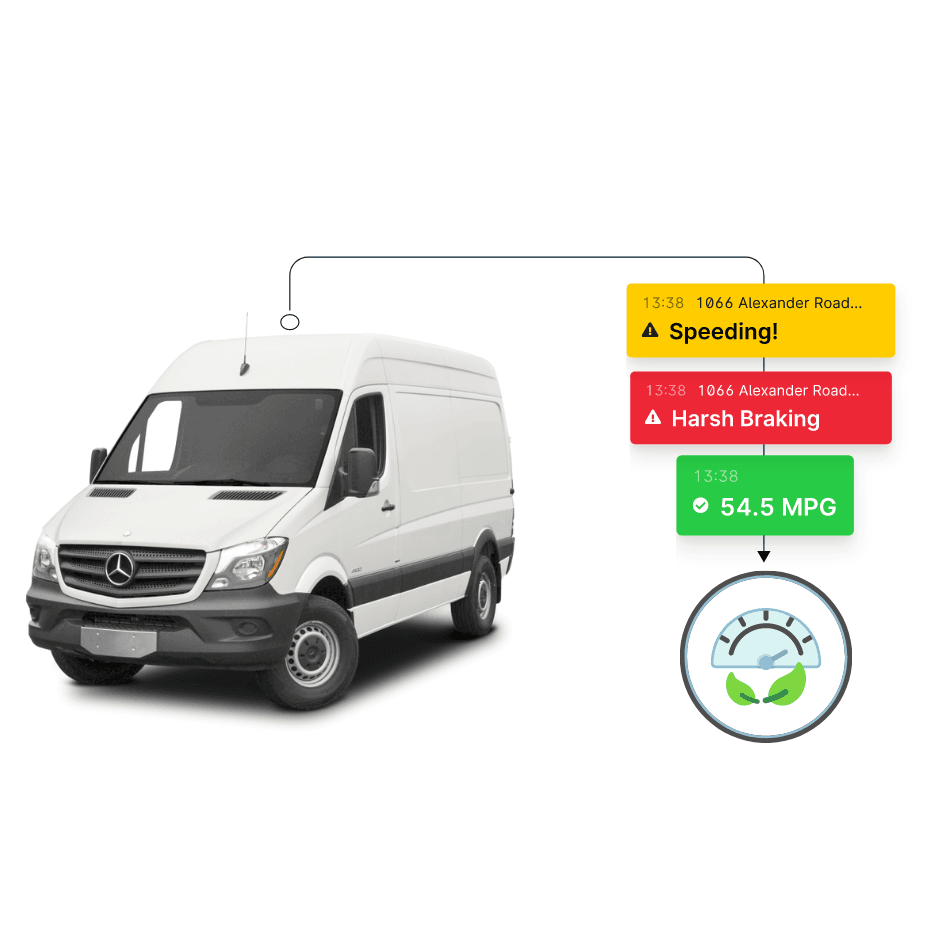Eco-driving saves fuel and boosts fleet efficiency
Fuel often accounts for more than 50% of a transport company’s expenses. Factors like harsh driving, excessive idling, poor route planning, and vehicle upkeep can affect that percentage even more. To flag excessive fuel use, transport and logistics companies are turning to eco-driving. Within GpsGate fleet managers can create a custom platform that measures individual driver and fleet behavior. Holistic data means companies have the information they need to avoid high costs and maintain a healthy bottom line.

What is eco-driving and why is it important?
Eco-driving is a growing practice among cargo and transport drivers. For GpsGate's tracking customers, turning to eco-driving is two-fold:
- Eco-driving leads fleets towards safer and more sustainable practices. Driver behavior is a key element of building an eco-driving program. The goal is safer driving practices which in turn use fewer resources.
- Eco-driving uses fewer resources and saves money. Green fleet operations have a huge cost-saving potential. With the proper fleet data from GpsGate, it's easy to spot fleet inefficiencies and create a roadmap to improve.
Why should fleets use less fuel?
With gas prices at record highs and new EU regulations on the horizon, better fuel management is a must. Some GpsGate customers are required by law to track and report their fuel use and carbon emissions to the government. That's why fleet managers use our platform to track fuel use, prevent fuel theft, and ensure that drivers are working towards common efficiency goals.
Fuel reporting in GpsGate
GpsGate’s standard fuel consumption reports help fleet managers avoid excessive fuel costs. Fleet managers can measure daily fuel consumption and fuel consumption that falls outside a fleet’s expected fuel usage. You can easily track vehicle mileage against a vehicle’s fuel levels and fuel refills. This identifies any anomalies or inefficient use so fleet managers know where to take action.
Configure notifications to flag suspected fuel theft
As fuel prices go up, so does the frequency of fuel theft. For regions where fuel theft is common, GpsGate’s tracking partners coach their customers to use trackers with special fuel theft signals. Once these devices are configured into GpsGate, fleet managers can receive live alerts. Fuel cap tampering can produce an instant SMS, in-app notification, or email. From there, it's easy to monitor the vehicle in real-time and contact the driver.
Want to know more about fuel management?
In our recent webinar with our long-time device partners at Queclink, experts from both companies covered ways to boost fleet productivity. Playback our webinar with Queclink here. It includes use cases within commercial agriculture and construction.

Components of eco-driving within GpsGate
GpsGate is on a mission to help fleets become greener. By reducing fuel dependency, taking better care of vehicles, and improving driver behavior, fleets can lower their carbon emissions. Eco-conscious operations not only reduce greenhouse gas emissions but also spark savings. Within GpsGate, fleet managers use real-time alerts, event rules, reporting, and preventative maintenance for greener fleet operations.
Begin by targeting fleet inefficiencies
Cold chain transport, public safety, transportation, and cargo logistics all have a unique set of conditions that need close monitoring. Eco-driving scores are a great way to start quantifying driver behavior. Activities like sharp turning, harsh acceleration and braking, speeding, and long periods of idling, are easy to monitor within GpsGate. Configuring business rules within our reporting feature generates eco-scores for individual vehicles and fleet groups. With better monitoring, it’s easy to spot fleet-wide opportunities to move more efficiently.

Fuel consumption & resource forecasting
Fuel usage and eco-driving go hand in hand. Tracking excessive idling and harsh driving behaviors in GpsGate allows fleet managers to identify patterns in individual fleet vehicles and teams. But fuel management is more than just monitoring and reporting – it’s important to proactively address fuel efficiency. GpsGate Maintenance allows you to schedule and track preventive vehicle maintenance to keep vehicles fuel-efficient and road-ready. Resource forecasting is also beneficial to helping fleets reduce their environmental impact, which is important as climate concerns start to play a role in business operations.
Extend vehicle life with proactive maintenance
Vehicle wear and tear is inevitable. With proactive vehicle maintenance, you can keep your fleet road-ready and forecast the life of fleet vehicles. GpsGate Maintenance is designed to help fleet managers identify the vehicles that are too costly to maintain. GpsGate gives fleets the data they need to phase out gas-guzzling cargo trucks as they transition to more eco-friendly vehicles.

Reduce tickets, fines, and lost time with eco-driving
Accidents and traffic violations are bound to happen but the result can be costly. Safe and methodical driving prevents excessive use of resources. Another part of eco-friendly driving is doing so at a reasonable speed via the most direct route. With GpsGate, fleet managers use route geofences to ensure drivers reach their destinations most efficiently. Creating safer roadways is better for all drivers and community members.
Is safety a concern for your fleet? Discover 5 ways to increase fleet safety with GpsGate.
Conclusion
With GpsGate, implementing a solid eco-driving program is possible. From real-time driver behavior alerts to custom reports, fleet managers have the full picture they need to make good decisions. Further, APIs and scripting mean that the possibilities for customization are endless. Paired with good fuel management, fleets can use GpsGate to transform their budgeting process and save big on resources.
- acceptCookies - We use this cookie to remember if you have closed this window or not.
- country - We use this cookie to serve you country-specific data.
- gg_sessionId - This cookie helps us debug sign-up issues and general errors.
You can read more about cookies and privacy here.